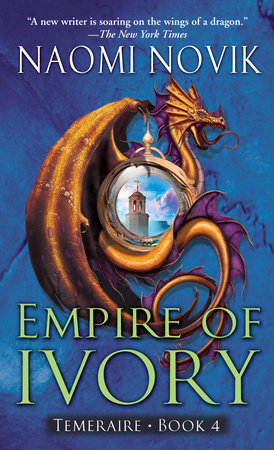BOOK DESCRIPTION:
Tragedy has struck His Majesty’s Aerial Corps, whose magnificent fleet of fighting dragons and their human captains valiantly defend England’s shores against the encroaching armies of Napoleon Bonaparte. An epidemic of unknown origin and no known cure is decimating the noble dragons’ ranks–forcing the hopelessly stricken into quarantine. Now only Temeraire and a pack of newly recruited dragons remain uninfected–and stand as the only means of an airborne defense against France’s ever bolder sorties.
Bonaparte’s dragons are already harrowing Britain’s ships at sea. Only one recourse remains: Temeraire and his captain, Will Laurence, must take wing to Africa, whose shores may hold the cure to the mysterious and deadly contagion. On this mission there is no time to waste, and no telling what lies in store beyond the horizon or for those left behind to wait, hope, and hold the line.
PRAISE FOR EMPIRE OF IVORY:
“In Novik’s earlier fantasies (His Majesty’s Dragon, etc.), readers soared to Europe and Asia on the wings of an intriguing premise: How would the Napoleonic Wars have played out if dragons not only existed, but participated in the war effort? The fourth part of Novik’s engrossing answer sweeps readers off to Africa, where the cure to the disease that has decimated England’s dragon forces may be found. The African adventures of British captain Will Laurence, his dragon Temeraire and their bedraggled band of aerial corps make up the book’s latter half, which showcases Novik’s knack for weaving dragons and dragon lore into a vivid, well-researched historical tapestry. In Africa’s wild interior, dragons shepherd and feed from elephant caravans while protecting the native villagers. This protection includes waging war against England’s slave-seeking colonists, a clash that Laurence and his band may not escape unscathed. Novik fills the conflict’s lead-up with lengthy meditations on dragon civil rights and England’s abolition movement, making for a fitful, pedantic first half. But most will find the richness of Novik’s developing world—and characters—to be worthy compensation for the slow start.” — Publishers Weekly







